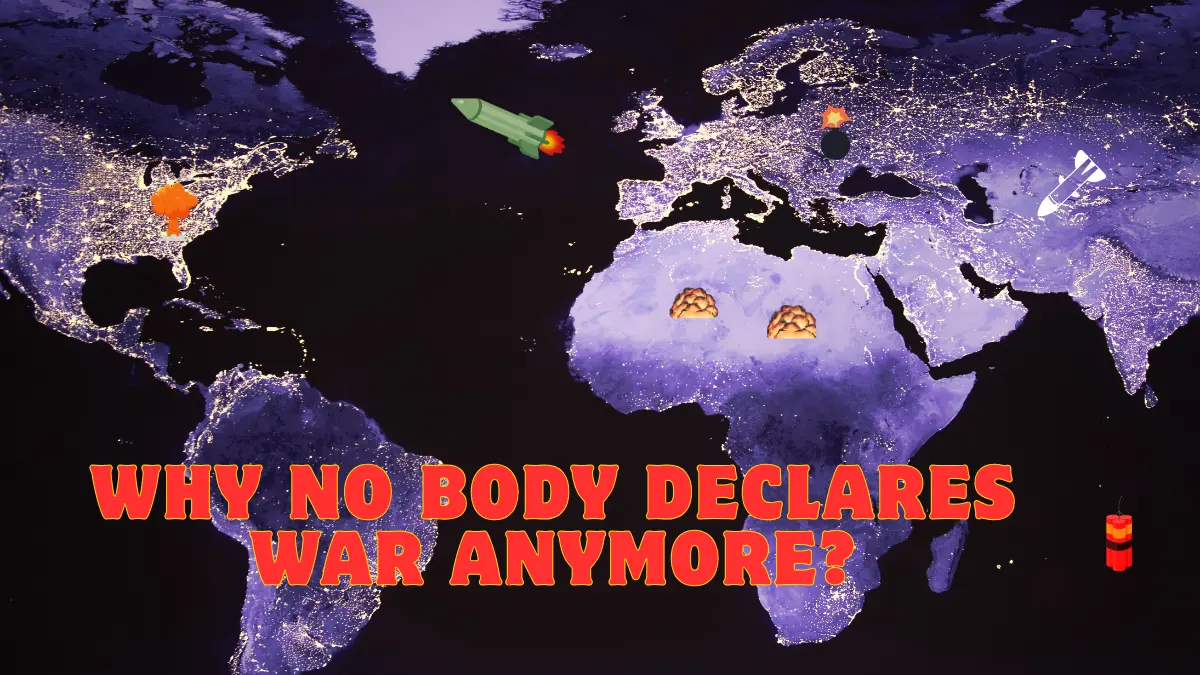Despite engaging in five major conflicts since 1950, the United States has not formally declared war once. From Korea to Iraq, military interventions have reshaped global history without following the traditional protocols of official declarations. This shift reflects a broader trend across global geopolitics, where war is waged in practice but not in name, altering accountability, legality, and public perception.
The Vanishing Act of War Declarations
Modern conflicts like Vietnam, Iraq, and Afghanistan are widely recognized as wars. Yet, none were formally declared as such. The last time the U.S. Congress issued a formal declaration of war was in 1942, against Bulgaria, Hungary, and Romania. Since then, over 240 military operations and up to 400 international interventions have occurred, sidestepping the constitutional process.
This trend is not unique to the United States. Globally, nations avoid the term “war” to skirt international treaties, political fallout, and legal scrutiny. For example, Russia’s 2022 invasion of Ukraine was labeled a “special military operation” rather than a war, deliberately avoiding international legal obligations that might have triggered harsh sanctions or treaty-based responses.
Historical Framework: Why Declarations Used to Matter
War declarations were once a norm under international law. The 1907 Hague Convention, particularly Article 1 of the “Convention Relative to the Opening of Hostilities,” required explicit declarations or ultimatums before initiating warfare. The goal was to provide clarity, give time for diplomacy, and maintain a semblance of legality.
While compliance was inconsistent, as seen when Nazi Germany invaded the Soviet Union in 1941 without warning, countries like the United Kingdom and France adhered to the formalities in WWII. The U.S. entered the war after Japan’s Pearl Harbor attack, following a swift and legal declaration ratified by Congress.
These mechanisms aimed to ensure democratic oversight, recognizing that war impacts the entire population, not just those in power. But post-WWII dynamics and evolving warfare technologies diluted this principle.
Rise of the Authorization for Use of Military Force (AUMF)
In the aftermath of 9/11, the U.S. embraced the Authorization for Use of Military Force (AUMF), bypassing formal war declarations. The Bush administration used AUMF to justify invasions of Afghanistan and Iraq. Subsequent presidents expanded its use, Obama deployed drones in Pakistan, Yemen, and Somalia under the same pretext. Even the 2011 NATO-led bombing in Libya bypassed Congressional approval, relying solely on the president’s commander-in-chief powers.
This pattern reflects a broader erosion of Congressional war-making authority, replaced by executive action and legal euphemisms. The consequences include reduced transparency, diminished public scrutiny, and a lack of clear objectives for soldiers and citizens alike.
International Law and the UN Charter: Legal Loopholes
The United Nations Charter, founded to prevent future wars, permits military action in self-defense (Article 51) or with Security Council authorization. Yet the Security Council itself is paralyzed by veto powers held by five permanent members, namely the U.S., Russia, China, the UK, and France.
This dysfunction enables major powers to intervene militarily without facing accountability. Truman’s labeling of the Korean War as a “police action” set the precedent, justifying massive U.S. and UN involvement without invoking war.
Even egregious cases like the Vietnam War or the 2003 Iraq invasion, widely regarded as illegal under international law, escaped scrutiny due to semantic gymnastics and strategic ambiguity.
The Costs of Avoiding the “War” Label
Avoiding formal war declarations benefits governments and defense contractors but exacts a steep cost. Without transparency and legislative oversight, military engagements lack public debate and legal clarity. Soldiers are deployed without well-defined missions, and the public is often misinformed about the war’s purpose or progress.
Vietnam veterans returned home disillusioned, and the Pentagon Papers later revealed that the U.S. government had long misrepresented the situation. The Iraq War followed a similar pattern, justified by false claims of weapons of mass destruction, resulting in international condemnation and long-term regional instability.
The Global Arms Economy and the Rise of Perpetual Conflict
Defense spending is now a cornerstone of many national economies. The U.S. allocates between $1 to $1.3 trillion annually to national security, part of a $2.7 trillion global military economy. This economic dependency fuels the concept of “Military Keynesianism,” where constant military readiness supports economic stability.
This reality incentivizes conflict over peace. Peace disrupts the status quo, while undeclared wars allow governments to maintain both military engagements and public calm.
The Multipolar Future: A Chance for Reform or Prelude to Chaos?
With U.S. global dominance waning, the world is transitioning toward a multipolar order. This shift offers a chance to rebuild an international system grounded in fairness, transparency, and mutual respect. Critics argue the current “rules-based order” has become a tool of convenience, enforced selectively and undermined by hypocrisy.
If war continues to be masked by vague language, accountability will erode further, and public trust in international law will collapse. Advocates call for an updated global framework where nations are compelled to label war as war, define objectives, and apply rules equally, regardless of size or power.
The disappearance of war declarations is not merely a semantic issue, it reflects deeper failures in democratic oversight, international law, and global power structures. Without naming war for what it is, governments avoid responsibility, the public remains misled, and victims of conflict suffer without justice.
Rebuilding a functional and honest international order begins with language. If nations are to wage war, they must say so. Only then can the global community begin to restore trust, accountability, and the hope of peace.
Also Read –
Astrodome: Houston Unveils Billion Dollar Plan to Revive Iconic Marvel
